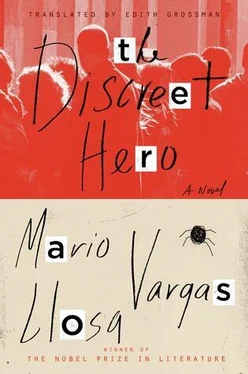At midmorning he called a halt to the search and returned to the center of Piura. It was hot, and before going back to the police station, he had a soda at the corner. The streets were filled with noise, cars, buses, students in uniform. Lottery-ticket sellers and trinket vendors hocking their wares, sweaty people all in a hurry, crowding the sidewalks. And then his memory retrieved the name and number of the street where his cousins, the León brothers, had lived: Calle Morropón 17. In the very heart of Mangachería. Half closing his eyes, he saw the faded façade of the one-story house, grillwork on the windows, pots of wax flowers, the chicha bar over which a white flag on a reed fluttered, a sign that cold chicha was served there.
He took a mototaxi to Avenida Sánchez Cerro and, feeling the drops of sweat streaming down his face and wetting his back, he walked into the ancient labyrinth of streets, alleys, crescents, dead ends, empty lots that had been Mangachería, a neighborhood, people said, that got its name because in colonial times it had been populated by slaves brought over from Madagascar. This had all changed too — in its form, people, texture, and color. The dirt streets were paved in asphalt, the houses were made of brick and cement, there were some office buildings, street lighting, not a single chicha bar or burro left in the streets, only stray dogs. Chaos had turned into order and straight, parallel streets. Nothing here resembled his Mangache memories now. The neighborhood had been made respectable and become colorless, impersonal. But Calle Morropón still existed, and so did number 17. Except that instead of his cousins’ little house he found a large auto repair shop, with a sign that read: WE SELL REPLACEMENT PARTS FOR ALL MAKES OF CARS, VANS, TRUCKS, AND BUSES. He went inside, and in the huge, dim place that smelled of oil he saw dismantled car bodies and engines, heard the sound of welding, observed three or four workers in blue overalls leaning over their machines. A radio played music from the jungle, “La Contamanina.” He walked into an office where a fan was humming. A very young woman sat in front of a computer.
“Good afternoon,” said Lituma, removing his kepi.
“Can I help you?” She was looking at him with the slight uneasiness with which people usually regarded the police.
“I’m looking for a family that used to live here,” Lituma explained, indicating the premises. “When this wasn’t a repair shop but a house. Their name was León.”
“As far as I know, this has always been a repair shop,” said the girl.
“You’re very young, you can’t remember,” Lituma replied. “But maybe the owner knows something.”
“You can wait for him if you’d like.” The girl indicated a chair. And then, suddenly, her face lit up. “Oh, I’m so dumb. Of course! The owner’s name is León, Don José León, to be precise. He probably can help you.”
Lituma dropped into the chair, his heart pounding. Don José León. Damn. It was him, his cousin José. It had to be the Unconquerable. Who else could it be?
He was on pins and needles as he waited. The minutes seemed endless. When the Unconquerable José León finally appeared in the shop — though he was now a stout, big-bellied man with streaks of gray in his thinning hair, dressed like a white man in a jacket, business shirt, and shoes shined as bright as glass — Lituma recognized him immediately. He stood, filled with emotion, and held out his arms. José, surprised, didn’t recognize him and brought his face very close to examine him.
“I see you don’t know who I am, cousin,” said Lituma. “Have I changed that much?”
José’s face broke into a broad smile.
“I don’t believe it!” he exclaimed, holding out his arms as well. “Lituma! What a surprise, brother. After so many years, hey waddya think.”
They embraced, patted each other’s backs under the astonished gazes of the secretary and the workers. They scrutinized each other, smiling and effusive.
“Do you have time for a coffee, cousin?” Lituma asked. “Or would you prefer to get together later or tomorrow?”
“Let me take care of two or three little things and then we’ll go and remember the days of the Unconquerables,” said José, giving him another pat on the back. “Sit down, Lituma. I’ll be free in no time. What a huge pleasure, brother.”
Lituma sat down in the chair again and from there he watched León examine papers on the desk, check some large books with the secretary, leave the office and walk around the shop, inspecting the mechanics’ work. He noticed how confident he seemed giving orders and greeting his employees, the ease with which he gave instructions or took care of questions. “Man, how you’ve changed, cousin,” he thought. It was difficult for him to reconcile the ragged José of his youth, running barefoot among the goats and burros of Mangachería, with this white owner of a large repair shop, who wore a suit and dress shoes in the middle of the day.
They went out, Lituma holding José’s arm, to a cafeteria-restaurant called Piura Linda. His cousin said their meeting called for a celebration and ordered beers. They toasted the old days and spent a long time nostalgically comparing their shared memories. Mono had been his partner in the repair shop when José first opened it. But then they’d had differences, and Mono left the business, though the two brothers were still very close and saw each other frequently. Mono was married and had three children. He’d worked a few years for the city and then opened a brickyard. It was doing well, many of the construction companies in Piura placed orders with him, especially now, when money was flowing in and new neighborhoods were going up. Every Piuran dreamed of owning a house, and it was terrific that good times had come. José couldn’t complain. It was difficult at first, there was a lot of competition, but gradually word spread about the quality of his service and now, in all modesty, his shop was one of the best in the city. He had more than enough work, thank God.
“In other words, you and Mono stopped being Unconquerables and Mangaches and turned into rich white men,” Lituma joked. “I’m the only one who’s still a poor beggar and will be a cop forever.”
“How long have you been here, Lituma? Why didn’t you look me up earlier?”
The sergeant lied, saying only a short while, and that the inquiries he’d made regarding José’s whereabouts had gone nowhere, and then he’d decided to take a walk around the old neighborhoods. That’s how he’d come face-to-face with Morropón 17. He never could have imagined that the sandy tracts with those crummy huts had turned into this. And with a first-rate auto repair shop!
“Times have changed, fortunately for the better,” José agreed. “These are good times for Piura and for Peru, cousin. I hope they last, knock wood.”
He’d married too, to a woman from Trujillo, but the marriage had been a disaster. They’d fought like cats and dogs and finally divorced. They had two daughters who lived with their mother in Trujillo. José went to see them from time to time, and they spent their vacations with him. They were at the university, the older one studying to be a dentist and the younger one a pharmacist.
“Congratulations, cousin. Both will be professionals, what luck.”
And then, when Lituma was getting ready to bring the pimp’s name up in conversation, José, as if reading his mind, beat him to it.
“Do you remember Josefino, cousin?”
“How could I forget a son of a bitch like him,” Lituma said with a sigh. And after a long pause, as if just making conversation, he asked, “Whatever happened to him?”
José shrugged and made a contemptuous face.
“I haven’t heard anything about him for years. He became a crook, you know. He lived off women, had little whores working for him, and went from bad to worse. Mono and I didn’t have much to do with him. He’d come by from time to time to put the touch on us, telling us stories about his ailments and the loan sharks who were threatening him. He even got involved in something really ugly — a crime of some kind. They accused him of being an accomplice or an accessory after the fact. I wouldn’t be surprised if one day he turns up somewhere murdered by those hoodlums he liked so much. He’s probably rotting in some jail, who knows.”
Читать дальше

![Гарри Гаррисон - Bill, the Galactic Hero [= The Starsloggers]](/books/87536/garri-garrison-bill-the-galactic-hero-the-star-thumb.webp)










